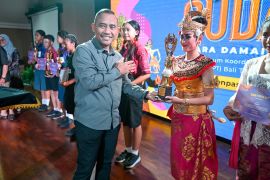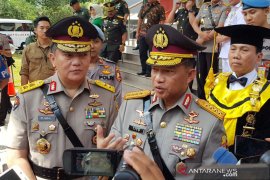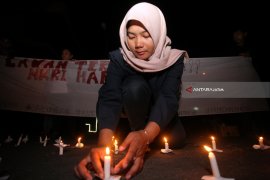Situbondo (Antara) - Radicalism and liberalism are two doctrines labelled as dangerous enemies by Islamic scholars attending a two-day international conference ending here on Sunday. The conference held at the Pesantren (Islamic Boarding School) of Salafiyah Syafi'iyah Sukorejo organized by the International Conference of Islamic Scholars (ICIS) were attended by Islamic experts such as Prof Dr Wahbah Az-Zuhaily (Syria), Syaikh Mahdi As-Sumaidai (Irak), Syaikh Abdul Karim Ad-Dibaghiy (Algeria), and KH Afifuddin Muhajir MAg (PBNU/Indonesia). "The scholars from various countries asked the governments to act firmly against elements from radicalism and liberalism groups seeking national disintegration in their respective countries," KH Lutfi Bashori said reading recommendations from the first day session of the conference. The participants of the conference also said in a statement Muslims should remain on guard against movements or teaching deviating from the real friendly Islamic teaching. "These groups are extremists tending to use force to get their view across," Lufty said. The scholars also warned against the damage caused by the western liberalism which tends to confuse the real religious teachings and messages. "We are firm in our agreement with the view of Hadratus Syaikh KH Hasyim Asy'ari (the founder of Nahdlatul Ulama) and that of Pesantren of Salafiyah Syafi'iyah that Islam is friendly," KH Lutfi Bashori said. Lutfi said the teaching of Hadratus Syaikh Hasyim Asy'ari was the manifestation of Islam brought in to the country by Walisongo (nine Islamic leaders). Secretary General of ICIS KHA Hasyim Muzadi said Islamic scholars had always been the forerunners of reform in the Indonesian history. Currently they are at the forefront of the fight against corruption, which is rife in the country, Muzadi said. "Scholars should maintain the morality of Islam, therefore, we called on all Islamic scholars to join in the fight against corruption," he said. He said the Corruption Eradication Commission (KPK) is facing certain forces that seek to block its way in the big fight against corruption in the country, he said. Scholars need to lend support for KPK, he added. He also called on the scholars to help keep politics in Indonesia clean from money politics ahead of the legislative election on April 9. Money politics and vote buying are against religious morality, and scholars must have the sense of responsibility to go against such practices, he said. The leader of the Pesantrens of Al-Hikam in Malang and Depok, said scholars have always been close to the people, therefore they could give moral and political education for the members of community. "The era of reformation has given a big opportunity for political parties to change Indonesia, therefore, improvement of the quality of political parties would have considerable impact on Indonesian advancement," he said. At the close of the conference, the scholars recommended greater moderation and greater tolerance in personal and political behaviors and in the implementation of the sharia teaching. The recommendations which were signed by Hasyim Muzadi were red out by young NU intellectual Cholil Nafis. Hasyim Muzadi said moderation in the implementation of the Sharia teachings would prevent violence and abuses as Islam is peaceful and merciful religion. He went on to say political moderation is to strengthen the theories of democracy and human rights. Islam teaches not only democracy and human rights, but also universal concept that appreciates democracy and places human in its true position, he said. Educational moderation concerns promotion of education for Muslims in all scientific disciplines, he said. Islamic faithfuls are facing great challenges in sciences, technology and information, he said. Moderation in economy is aimed at improvement in the economy of Islamic communities as the majority of Muslims are facing economic problems, he said. "It is import now to disseminate Islamic teachings in a moderate way all over the world to create lasting world peace. It is necessary for all of us to convey the results of the conference to the entire Indonesian people as well as the world," Lutjeng Lutfiyah, a conference spokesman said. (*)
Berita Terkait

Nabawi Grand Imam stresses Islamic education's crucial role in society
10 Oktober 2024 16:17

Ahmadiyah Mosque in Tulungagung Sealed by Local People
20 Mei 2013 21:07

Early prevention can shield youth from radicalism: BNPT
1 Agustus 2025 22:00

Kapolri: Pelaku penyerang Polsek Wonokromo lakukan "self radicalism"
18 Agustus 2019 15:43

UB Cooperates With Intelligence Officials to Stem Radicalism
5 Juni 2018 22:57

Do Not Spread Radicalism in Universities: President Jokowi
26 September 2017 13:22

Radicalism Arising from Failed Islamic: VP
9 Mei 2016 16:42

Leaders of Blocked Websites Complain to House
1 April 2015 22:25

